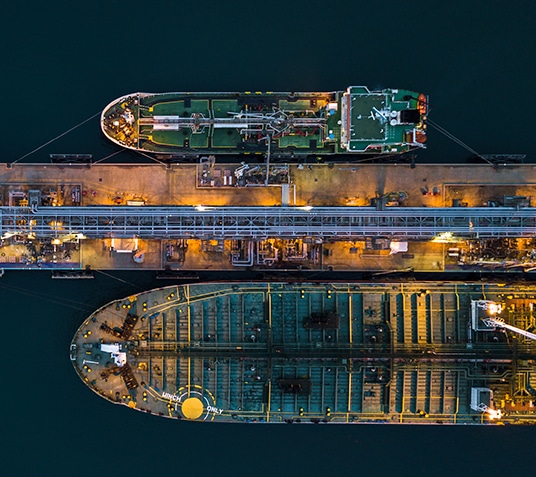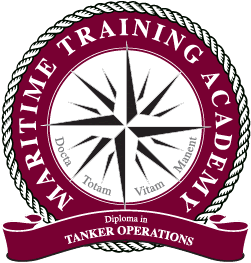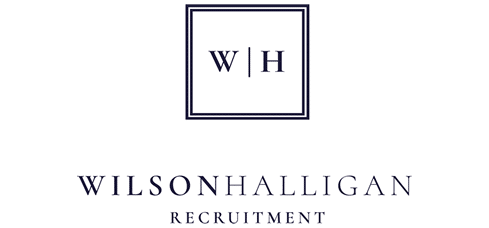Tanker Operations Course
Become a Certified Tanker Operations Specialist
The tanker operation course’s learning structure is considered suitable for new intakes about to serve on tankers and tanker company management personnel who wish to form a broad knowledge of tanker operations. The course also serves to broaden and fill in the knowledge gaps and give a better grounding to those professionals already in this section of the marine industry (marine crew including onshore technical staff, suppliers, educators, trainers as well as equipment manufacturers).

Duration:
12 – 18 months

Modules:
9 in total

Cost:
Diploma: £3,195
Certificate: £2,295

Recognised by: 
Training in Cargo Handling, Safety Systems, Environmental Protection & Tanker Law
The Tanker Operations course is designed to encompass all aspects relating to the operation of the tanker. The subject matter gives a historical description of the tanker and the types used. The course also discusses all aspects relating to loading off-loading etc., including the tankers operating equipment. In addition the course describes all safety issues relating to the tankers operations.

Course Structure
The course consists of 9 modules. All students are required to successfully complete and pass the module assignments. Diploma students will also be required to sit and pass a final examination.
1. Tanker Operations Introduction
- History of the oil tanker
- Types of oil and its characteristics
- Tanker personnel (duties & responsibilities)
- Safety practices onboard
- Environmental factors (IMO Tanker safety – preventing accidental pollution)
- Tanker case histories including:
- Exon Valdez
- Torrey canyon
- The Erika
- The historical evolution of inert gassing on tankers
2. Tanker Design and Construction
- Tanker categories
- Construction of tanker types
- Tanker design and equipment
- Cargo tanks layout and associated equipment
- Inert gas system
- Cargo heating system
- Ship (Tanker) Inspection
3. Tanker Stability, Gauging Systems and Operating Systems
- Safety and stability overview
- The ballast system
- Tank gauging and types of gauging
- Tanker operating systems
4. Cargo Operational Checks and Procedures
- Voyage cargo orders
- Cargo operations terminology
- Cargo handling overview
- The loading plan
- Terminal safety regulations
- Emergency procedures onboard oil tankers
- Piping, manifold with cargo hoses and their handling
- Loading and unloading cargo
- Chemical tanker operation cargo loading preparation overview
- Tank cleaning – crude oil washing (cow)
- Tanker routine checks
5. Cargo Management Systems and Safety Control Systems
- Hazardous areas
- The HVAC system and shutdowns
- Cargo tank gas freeing and purging
- Tank entry and procedure
- Cargo operations forms
- Cargo control system
- The stripping system
- The effects of static electricity
- Control of oil discharge and the ODME for ballast water
- Ship oil pollution emergency plan (SOPEP)
- Safe operation of tankers
6. Tanker Fire Safety and Maintenance Systems
- Active firefighting systems
- Foam delivery systems
- Accommodation sprinkler systems
- CO2 system
- Water mist system
- Inergen fire suppressant system
- Passive fire protection systems
- General firefighting equipment
- Fire and gas systems
- Planned maintenance systems
- Material safety data sheets
7. Shuttle Tankers /FSU/MCV Operations
- Shuttle/offtake tanker and associated systems
- Shuttle tanker – dynamic positioning systems
- Propulsion systems and controls
- Shuttle/offtake tanker firefighting systems
- Shuttle tanker safety equipment
- Competence and manning overview
- Types of mooring systems
- Mooring shuttle tanker to FPSO (fishtailing)
- Pre-tanker berthing checks to SPM
- The floating storage unit (FSU) overview
- Modular capture vessel (MCV)
8. Tanker Law
- Legal concepts
- The Law of Contract
- The Law of Tort (Negligence)
- Liability in Contract and Tort
- Maritime Law
- Admiralty Law and jurisdiction
- International Maritime Law
- Shipboard documentation
- The Flag State
- Governmental control of shipping
- Single – v – double hull tankers
- Pollution
- Contracts and chartering tankers
- Tanker charterparties
- Carriage of goods by sea and international trade
9. International Codes for Tankers & Safety Procedures
- The International Maritime Organisation (IMO)
- Pollution
- Maritime Codes Dealing with Carriage of Dangerous Goods
- Oil Companies International Marine Forum (OCIMF)
- International Safety Guide for Oil Tankers and Terminals (ISGOTT)
Career Pathway
Career path:
Normally through a seagoing career before coming ashore in an operational role in a management or oil company.
Salary:
For a junior position, around £35,000 per annum, rising to £65,000 for a senior position.
Duties:
All aspects of controlling tanker operations from a shore-based perspective including commercial and scheduling, maintenance, and operation.
Meet the Course Director
Ian Bryant
My career spans over 40 years from all operating stages to Chief Engineer on a variety of vessels including cable-laying ships and other offshore assets, such as offshore drilling ships/ rigs and selfpropelled jack-up units.
More recently from 2002, I formed an independent Offshore Consultancy providing a range of services based around training, system procedures and competency for Offshore Blue Chip Companies involved in offshore drilling and the offshore renewables. The renewables relate to Wind Turbine Installation Vessels, HVAC substations and other aspects of the wind energy sector.
Other aspects of work include operations manuals for offshore renewables and oil and gas assets as well as Failure Mode Effect Critical Analysis (FMECAs) for well-known offshore companies.


DIPLOMA IN TANKER OPERATIONS
On passing the Diploma, you will receive the above icon. Please use it on your business cards, LinkedIn profile and website(s)!
You can also use these letters after your name: MTA Dip MTank
Why Choose The Maritime Training Academy?

Flexible
Online learning allows you to study in your own time, at your own pace from anywhere in the world. This saves on travel and classroom costs and allows you to fit your studies around your job and progress your career.

Supportive
While the nature of distance learning is independent study, we recognise the importance of support. Students can contact us at any time during their course for assistance and our team of industry experts are always on hand for advice.

Expertise
We have over 50 industry experts writing, developing and advising on our course material. We truly believe that allowing students to tap into their expertise and knowledge is of the utmost importance to fulfil your dream career.
If you would prefer to complete this as a classroom-based course, please contact us.
FAQs
How long do the courses take to complete? What's the difference between a Diploma and a Certificate? Read through our Frequently Asked Questions below to find out the answer.
















